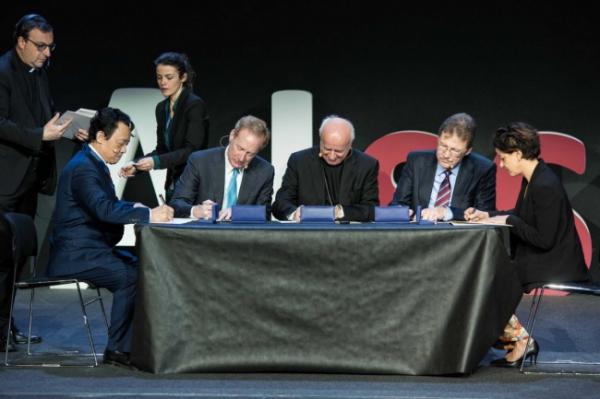Vatican calls for ethics: only for corporations?
Really? Why?

Last week the president of the Pontifical Academy for Life and (among others) two top executives from Microsoft and IBM have signed the Rome Call for Ethics in Artificial Intelligence
Before the meeting Fabrizio Mastrofini, Media Manager of the Academy, had explained that, among other things:
- in general, it is necessary to gather experts “to better understand ethics in Artificial Intelligence”
- the Holy See is well aware that “Artificial Intelligence can be used to improve conditions or to create more inequality”
- “Companies like Microsoft and IBM contacted… the Pontifical Academy for Life [because] they feel the increased importance of ethics in technology. Companies that are sensitive to users' needs perceive the responsibility technological progress brings.”
Everybody must do their part. Good, but…
The Call for Ethics that was signed last week to “put humans at the centre of new technologies” explicitly says, among other things, that (emphasis mine):
- Given the innovative and complex nature of the questions posed by digital transformation, it is essential for all the stakeholders involved to work together and for all the needs affected by AI to be represented
- The development of AI in the service of humankind and the planet must be reflected in regulations and principles that protect people - particularly the weak and the underprivileged - and natural environments
- The ethical commitment of all the stakeholders involved is a crucial starting point
Where are the meeks?
High-level calls and concrete actions for more ethical development and use of technology are surely overdue, because math and tech specialists are the LAST people who need Hippocrates-style oaths. And there is no doubt that current “Big Tech” should be directly, explicitly involved, and start making more concrete steps towards the common good.
Consequently, I am very happy that the Academy, and Vatican in general, are paying high attention to these matters, and that they issued such a Call for Ethics in Artificial Intelligence.
The only question I have on this, and is a sad one, is: Where were all the OTHER stakeholders last Saturday? How were all the needs, “particularly those of the weak and the underprivileged” concretely represented? Where were the meeks that shall inherit the Earth?
Where is REALLY open and fair technology?
The questions above do not mean I believe that the Academy, or the Catholic Church in general, do not act in the interests of the weak and underprivileged!
But I have said for almost fourteen years now that:
- Catholics have even more reasons than others to go for open digital technologies
- more specifically, Catholic Social Doctrine And the Openness Revolution are Natural Travel Companions
Indeed, in the Academy’s official report of the event there are “openings to opennes”, so to speak: “The Call’s intention is to create a movement that will widen and involve other players: public institutions, NGOs, industries and groups to set a course for developing and using technologies derived from AI."
That IS the way to go, and as far as I am concerned, I’m at the Academy’s disposal to work on it. However, in most other reports I’ve seen that message doesn’t apppear, and this makes me wonder what “Big Tech” will actually make of the Call.
In those reports, I see the same thing I wrote about three years ago, after another Pontifical Conference on core ethical values. I find in them
“practically NO real mention, or symptoms of awareness (in the public talks and debates of that specific conference, of course!) that [discussion of something so crucial] should not be started only with for-profit, corporate players”
Sure enough, when it comes to “artificial intelligence”, in many cases the real, main question is not “how open” the underlying technology should be: it is whether certain data should be collected in the first place, or if “artificial intelligence” should be used at all to displace or complement human agency. But even in those case, or even more in those cases, why have, at events like that, only huge corporations and other organizations? Why not directly involve, at the same level, humbler stakeholders, that would bring to the table alternative visions, proposals and skills from the trenches?
Who writes this, why, and how to help
I am Marco Fioretti, tech writer and aspiring polymath doing human-digital research and popularization.
I do it because YOUR civil rights and the quality of YOUR life depend every year more on how software is used AROUND you.
To this end, I have already shared more than a million words on this blog, without any paywall or user tracking, and am sharing the next million through a newsletter, also without any paywall.
The more direct support I get, the more I can continue to inform for free parents, teachers, decision makers, and everybody else who should know more stuff like this. You can support me with paid subscriptions to my newsletter, donations via PayPal (mfioretti@nexaima.net) or LiberaPay, or in any of the other ways listed here.THANKS for your support!